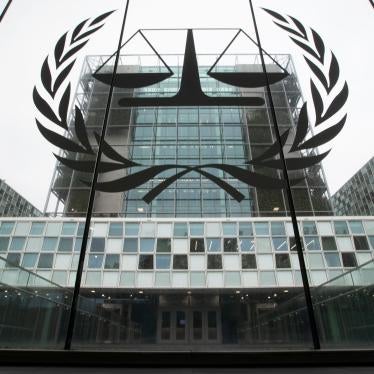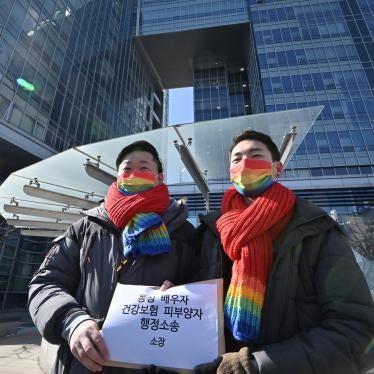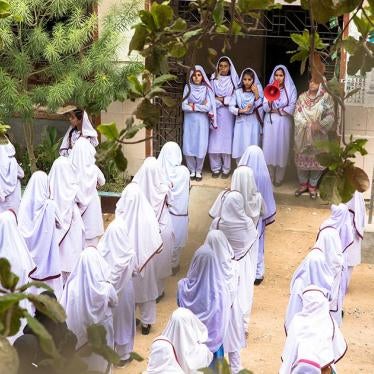Human Rights Watch thanks the International Development Committee for the opportunity to submit comment towards the ongoing inquiry, titled "Prospects for Sustainable Peace in Uganda".
Human Rights Watch monitors human rights in more than 70 countries around the world and has investigated violations of human rights and international humanitarian law in northern Uganda for more than a decade, issuing reports based on in-depth fact-finding. In March 2007, Human Rights Watch conducted a mission to Kampala and several locations in northern Uganda to assess the work of the International Criminal Court and the developments in the peace talks taking place in Juba, southern Sudan.
Overview
The current peace talks between the Ugandan government and the Lord's Resistance Army (LRA) create prospects for ending the devastating 21-year conflict in northern Uganda. Since the conflict began in 1986, serious crimes in violation of international law and other human rights abuses committed by the LRA and, to a lesser extent, by government forces have been documented by Human Rights Watch and other human rights organizations.
Human Rights Watch firmly believes that any outcome for northern Uganda must include both a peace agreement and fair, credible prosecutions of those responsible for the most serious crimes committed by both sides during the conflict, together with broader accountability measures. As discussed below, we believe that such prosecutions are essential not only to accountability, but also to establishing a durable peace.
Arrest warrants issued by the International Criminal Court (ICC) for four LRA leaders for war crimes and crimes against humanity provide a major opportunity to ensure justice is done for at least some of the serious crimes committed. The June 29 agreement between the parties on accountability and reconciliation looks to possible national trials of those who "are alleged to bear particular responsibility for the most serious crimes." The ICC allows and favors national trials of its cases where possible. However, consistent with the ICC's Rome Statute and international standards, any national alternative to ICC trials should satisfy the following substantial benchmarks as detailed in a May 2007 memorandum by Human Rights Watch:
- Credible, impartial, and independent investigation and prosecution;
- Rigorous adherence in principle and practice to international fair trial standards; and
- Penalties that are appropriate and that reflect the gravity of the crimes.
Key governments such as the United Kingdom, UN representatives, and the Uganda peace talks mediation team have a crucial role to play in ensuring both peace and justice are achieved in northern Uganda. We urge the United Kingdom to use all appropriate influence toward this end, including calling on the Ugandan government to ensure that any proposed national trials for serious international crimes and other human rights abuses meet these critical benchmarks.
The determination of the sufficiency of national trials of ICC cases is ultimately in the hands of the ICC judges. In the event that the above benchmarks are not met, the ICC should remain the appropriate forum to try all persons for whom the ICC has issued arrest warrants.
The importance of credible prosecutions in accordance with international standards
The conflict in northern Uganda has been characterized by serious human rights abuses and by violations of international humanitarian law. These include willful killings, large-scale abductions, forced recruitment of adults and children, sexual violence against girls assigned as "wives" or sex slaves, and large-scale looting and destruction of civilian property by the LRA. These also include extrajudicial executions, rape, torture and cruel, inhuman and degrading treatment, arbitrary detention, and forced displacement by government armed forces.
International law mandates prosecutions and appropriate punishment for serious violations of human rights and humanitarian law. But the importance of justice goes beyond legal obligations. Prosecutions send the message, especially to would-be perpetrators, that no one is above the law. This can help consolidate respect for the rule of law and contribute to deterring future abuses, thereby helping to cement peace and stability. As indicated in the UN secretary-general's 2004 report on transitional justice: "[E]xperience...has demonstrated clearly that the consolidation of peace in the immediate post-conflict period, as well as the maintenance of peace in the long term, cannot be achieved unless the population is confident that redress for grievances can be obtained through legitimate structures for the peaceful settlement of disputes and the fair administration of justice."
Human Rights Watch researchers spoke with displaced persons in northern Uganda in March 2007. Nearly all expressed an intense desire to return home and a number conveyed real concern that ICC prosecutions could be an obstacle to peace in light of LRA demands that the ICC arrest warrants be dropped. At the same time, members of civil society suggested that a peace agreement based on impunity is unlikely to be sustainable after victims settle back home and realize that the crimes against them and their loved ones have been excused. A distinct vocal minority of displaced persons also declared a strong desire to see alleged perpetrators tried.
In other countries, communities have experienced how measures conferring immunity from prosecution for serious offenses have had devastating consequences. In Sierra Leone, the rebel leader Foday Sankoh, who had been implicated with his Revolutionary United Front (RUF) in many war crimes, received an amnesty in exchange for signing the Lomé Peace Accord in 1999. Only months later, Sankoh's RUF went on to attack government forces and UN peacekeepers and continued to commit war crimes by taking hundreds hostage and by committing rampant sexual assault. The collapse of the accord also brought about a marked increase in human rights abuses by government forces and a return to peace only occurred two years later. Meanwhile, the Special Court for Sierra Leone pursued prosecutions, including of government officials, which helped to marginalize abusive leaders of the warring parties.
Possible national alternatives to ICC cases, and the crucial issue of adequate penalties
The ICC's arrest warrants for LRA leaders are an important step forward to seeing justice done for some of the most serious crimes committed during the conflict. It is with this in mind that we examine the June 29 agreement on accountability and reconciliation between the LRA and the government of Uganda. The agreement, which will be further elaborated through implementing protocols developed by the parties in the coming weeks, includes important elements with respect to justice for serious crimes committed in northern Uganda. In Articles 6.1 and 6.2 the agreement provides for national trials to address international crimes and other serious violations of human rights, including by members of both the Ugandan armed forces and LRA. In addition, the agreement recognizes a role for broader accountability measures, including truth-telling and traditional justice, which Human Rights Watch believes are important for rebuilding societies affected by conflicts.
The ICC's Rome Statute allows national trials in lieu of ICC trials, but consistent with the Rome Statute and international human rights standards, this option is only possible if substantial benchmarks are met. In this regard, the new agreement raises crucial questions on the issue of penalties. The agreement provides for the introduction of "a regime of alternative penalties" in Article 6.3 which will "apply, and replace existing penalties, with respect to serious crimes and human rights violations committed by non-state actors in the course of the conflict." It is unclear from the agreement and public statements what "alternative penalties" may be implemented and what "existing penalties" will be replaced.
The Rome Statute's requirements for any national alternative to its cases as detailed in Article 17 relate to whether a state is able and willing to investigate and prosecute a case. Article 17 does not explicitly discuss penalties. However, we believe that the need for adequate penalties goes directly to a state's unwillingness to investigate and prosecute, including, as set out in Article 17(2)(c), when "proceedings...were or are being conducted in a manner which...is inconsistent with an intent to bring the person concerned to justice." The Rome Statute's object and purposes as detailed in its preamble and which include "affirming that the most serious crimes...must not go unpunished" reinforce this assessment.
The jurisprudence and statutes of current international and hybrid criminal tribunals have made clear the appropriate penalty for serious international crimes: the ICC, the ad hoc tribunals for Rwanda (ICTR) and the former Yugoslavia (ICTY), and the Special Court for Sierra Leone (SCSL) all provide imprisonment as the principal form of punishment. The ICC's primary penalty under Article 77 is a specified number of years up to thirty years or life imprisonment.
The statutes of these international and hybrid criminal tribunals also indicate that penalties imposed should be commensurate with the gravity of the offense, while also taking into account individual circumstances, such as possible mitigating factors. Case law from the Rwanda and Yugoslav tribunals further supports the basic concept. Moreover, in assessing the gravity of the offense, case law from these tribunals suggests that the degree of an individual's participation and the role in perpetrating an offense are significant. Specifically, an offender who plans or acts in a leadership role has been viewed as committing a graver offense than a subordinate.
Without addressing particular crimes or counts on conviction, a 2002 study of sentencing practice at the Yugoslav and Rwandan tribunals found that the mean sentence was 16 years at the ICTY while the majority of individuals convicted by the ICTR were sentenced to life imprisonment.
The Ugandan penal code likewise provides substantial imprisonment as a penalty for serious domestic offenses. Ugandan case law further reinforces the principle that penalties should reflect the gravity of the crime and that imprisonment is an appropriate penalty for serious crimes. A selection of relevant Ugandan criminal appeals judgments available to Human Rights Watch indicates, for example, that given the seriousness of the crime and the particular circumstances involved, sentences from eight years to life imprisonment were deemed appropriate in cases involving rape and defilement.
The Ugandan penal code also includes the death penalty for serious domestic offenses, which is not permitted by international and hybrid criminal tribunals and which Human Rights Watch opposes in all circumstances as a cruel and inhuman punishment.
Within this context, Human Rights Watch believes imprisonment should be the primary penalty for the most serious crimes committed during the conflict. We further believe that any national proceeding allowing a "slap on the wrist sentence" in the event of conviction for serious crimes would be wholly inconsistent with the ICC requirement of "intent to bring a person to justice."
The ICC as the arbiter of the adequacy of national alternatives to its cases
Under Article 19 of the Rome Statute, the ICC judges decide whether a trial in domestic courts is an adequate alternative to its cases. Article 19(10) of the Rome Statute also suggests that if a national alternative does not meet the Rome Statute's requirements, it can be brought back to the ICC for trial. As such, national trials must be adequate not only in principle, but in practice.
Support for justice, sustainable peace, and re-development in northern Uganda
Human Rights Watch appreciates the ongoing engagement by the United Kingdom in regard to northern Uganda. We expect that your government will take every opportunity to insist on an outcome that is consistent with international standards, including the Rome Statute.
In addition, we call on the United Kingdom to continue to support the government of Uganda in translating plans for relief and reconstruction, including through the Joint Monitoring Committee and the Peace, Recovery, and Development Plan, into concrete improvements in the protection of human rights in northern Uganda. Notwithstanding gains in improved security and humanitarian access in the past 12 months, we note that more than one million persons remain confined to camps and settlement sites for the internally displaced in northern Uganda.
We thank the committee for their interest in these important issues.
Richard Dicker,
International Justice Director, Human Rights Watch
Tom Porteous
London director, Human Rights Watch






